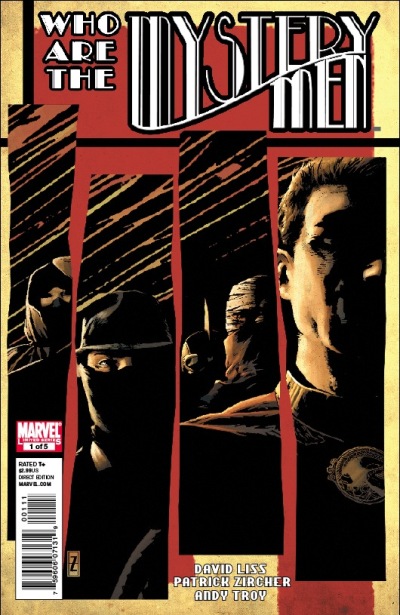Mystery Men 1
Reviewed by Martin Skidmore 27-Jun-11
I have my qualms about these retro series (this is set in 1932): I think they can undermine the importance of the first Marvel heroes as currently established, and aren’t always plausible in how they fit in with their world’s history. Nonetheless, this one is rather good, so I’ll put those doubts aside – at least until any of the promised links with the existing Marvel Universe materialise, for better or worse.
I have my qualms about these retro series (this is set in 1932): I think they can undermine the importance of the first Marvel heroes as currently established, and aren’t always plausible in how they fit in with their world’s history. Nonetheless, this one is rather good, so I’ll put those doubts aside – at least until any of the promised links with the existing Marvel Universe materialise, for better or worse.
It introduces a gentleman thief called the Operative and a black superhero called the Revenant, plus a sinister general who is clearly the main villain of the piece, and some supernatural ally of his. I like the way it combines the glamour of the time – the Operative looks just like Clark Gable, and we get lavish parties and a female pilot – with noir devices like private eyes and corrupt cops, and some real interest in social issues. These are particularly well woven in so far, with a black superhero being notable, but also some stuff concerning sexism and unions and lots about the poverty of the depression era and other social injustices. This gives the comic a richness and breadth beyond its superhero adventure elements.
It’s also nicely scripted, character deftly sketched or suggested in a few lines, plus moments that are clearly important and informative handled sometimes in a few well-chosen words. This is complemented superbly by the art, clean and sharp (reminded me a little of Steve McNiven), with a real feel for the time, lots of excellent faces with precise expressions, clear and lively action and a couple of extremely strong panels. He goes for lots of full-width panels, very horizontally oriented, but that kind of evoked for me old movies, which is fitting enough. I wasn’t familiar with Zircher before, but I am very impressed – he really doesn’t put a foot wrong in any way in this. Except perhaps with a rather dull cover, sadly.
I don’t know how good this five-issue series will prove to be, and I do slightly fear the attempts to link it to existing continuity, but this is a pretty exemplary start in its broad thinking about the era, its skillful scripting and excellent art, so I’ll keep buying.
Tags: David Liss, Marvel, Mystery Men, Patrick Zircher
This is such a pity. We were preparing the monthly order for 30th Century, and the solicitation page in previews for Mystery Men consisted of a black rectangle where the cover should be, and the word “Classified”. That was it, in a phonied-up attempt to generate ‘drama’.
Had I *known* the setting and theme of the series, I would certainly have ordered it for myself, and would have strongly lobbied for the shop to carry it.
But as it is, no information, no picture = no sale to us for Mystery Men.
Besides, isn’t the Flaming Carrot guy still around? Shouldn’t he have some say in the use of the term Mystery Men, since there was a moderately successful movie made of that name?
Yes, that occurred to me too – I don’t know what is happening regarding Bob Burden, if anything.
He isn’t terribly happy.
http://www.bleedingcool.com/2011/06/08/talking-to-bob-burden-about-mysterymen-mystery-men-trademarks-and-comics/
Having given this a good review, I’d like to add that I am entirely on Bob Burden’s side here, and I hope he wins whatever case gets brought. This is partly on principle, and partly because I hung out with Bob for some while at San Diego long ago, and he is a thoroughly nice and fun guy.
top marks for reviewing all the titles I’ve been planning to get round to reviewing “sometime”.
one thing that struck me about this issue and its sequel was that it is yet another pulp-nostalgia comics title. What is odd about this is that the appetite for things that directly reference pulps and play on pulp nostalgia is out of all proportion to people’s actual interest in the original pulp artefacts themselves. I don’t know why this would be the case.